Project Management Phase for BCM Planning Methodology for Hotels
Business Continuity Management (BCM) is a cornerstone for organisations striving to ensure resilience and operational stability during unforeseen disruptions.
For hotels where guest satisfaction and seamless operations are critical, a robust BCM planning methodology is not just an option but a necessity.
This phase helps organise efforts, allocate resources, and align the plan with the hotel's strategic objectives and operational nuances.
 In the hospitality industry, disruptions can range from natural disasters and power outages to cybersecurity threats and health emergencies.
In the hospitality industry, disruptions can range from natural disasters and power outages to cybersecurity threats and health emergencies.
These risks can disrupt service delivery, erode customer trust, and impact financial performance.
By approaching BCM with a structured project management methodology, hotels can ensure they are prepared to mitigate these risks and recover swiftly, minimising operational downtime and safeguarding their reputation.
This chapter delves into the intricacies of the project management phase, focusing on how hotels can effectively initiate, plan, and organise their BCM efforts.
From assembling a dedicated team to conducting thorough risk assessments, the process sets the stage for resilience and operational excellence in times of crisis.
Understanding the Project Management Phase
The project management phase is the initial stage of a BCM planning methodology. It involves defining the scope, objectives, and framework for the BCM project. This phase ensures the planning process aligns with the organisation's strategic goals and operational priorities.
This phase must address unique hotel challenges, such as guest safety, uninterrupted service delivery, and compliance with industry regulations.
Key Steps in the Project Management Phase
Project Initiation
- Establish Objectives. Define the primary goals of the BCM plan, such as ensuring guest safety, safeguarding assets, and minimising downtime during disruptions.
- Form a BCM Team. Assemble a cross-functional team comprising representatives from operations, security, IT, HR, and other relevant departments.
- Stakeholder Engagement. Identify and engage stakeholders, including hotel management, staff, and external partners, to ensure alignment and support.
Scope Definition
- Assess Hotel Operations. Evaluate critical business functions, such as guest services, reservations, housekeeping, and food and beverage operations.
- Identify Key Risks. Analyse potential threats, such as natural disasters, cyberattacks, power outages, and public health emergencies.
- Set Boundaries. Define the scope of the BCM project to focus on high-priority areas while considering resource limitations.
Project Planning
- Develop a Timeline. Create a realistic project timeline with milestones and deadlines.
- Allocate Resources. Assign roles, responsibilities, and resources to team members.
- Budgeting. Estimate the financial resources required for the BCM planning process and secure approval from hotel management.
Risk Assessment and Analysis
- Conduct Risk Assessments. Use SWOT analysis or Risk Impact/Probability Charts to evaluate risks.
- Prioritise Risks. Focus on risks with the highest likelihood and impact on hotel operations.
Communication and Training Plan
- Develop Communication Strategies. Outline how information will be shared within the team and with external stakeholders.
- Plan Training Sessions. Schedule regular training for staff on BCM practices, emphasising their roles during a crisis.
Critical Success Factors
- Leadership Support. Active involvement from senior management ensures the BCM plan aligns with the hotel's strategic priorities.
- Comprehensive Risk Identification. Thoroughly analysing risks specific to the hotel industry enables the development of targeted strategies.
- Collaboration and Engagement. A collaborative approach fosters buy-in from all stakeholders, enhancing the plan's effectiveness.
- Realistic Planning. Setting achievable goals and timelines ensures the BCM plan is practical and actionable.
Summing Up …
The project management phase is a fundamental component of the BCM planning methodology, particularly for the hotel industry. It lays the groundwork for ensuring resilience and operational stability by defining objectives, engaging stakeholders, and addressing unique risks inherent to hospitality.
By initiating the project with clear goals and assembling a cross-functional team, hotels can align their BCM efforts with strategic priorities.
Effective project management in BCM involves comprehensive risk assessments, realistic resource allocation, and thorough training programs. By focusing on critical success factors such as leadership support, stakeholder collaboration, and achievable planning, hotels can build robust continuity plans.
Ultimately, the BCM framework empowers hotels to maintain service excellence and customer trust, even during disruptions. Through meticulous planning and execution, the BCM framework ensures that hotels can effectively navigate challenges, maintaining service excellence and operational resilience.
More Information About Business Continuity Management Courses

 To learn more about the course and schedule, click the buttons below for the BCM-300 Business Continuity Management Implementer [B-3] course and the BCM-5000 Business Continuity Management Expert Implementer [B-5].
To learn more about the course and schedule, click the buttons below for the BCM-300 Business Continuity Management Implementer [B-3] course and the BCM-5000 Business Continuity Management Expert Implementer [B-5].
![Register [BL-B-3]*](https://no-cache.hubspot.com/cta/default/3893111/ac6cf073-4cdd-4541-91ed-889f731d5076.png) |
 |
 |
 |
 |
 |
![FAQ [BL-B-3]](https://no-cache.hubspot.com/cta/default/3893111/b3824ba1-7aa1-4eb6-bef8-94f57121c5ae.png) |
If you have any questions, click to contact us.
|
 |
 |
 |
 |


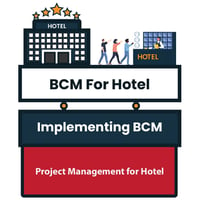
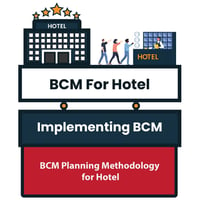
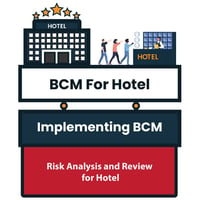
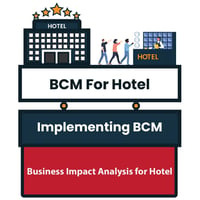
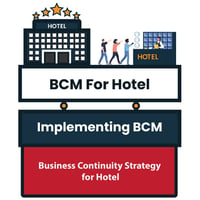
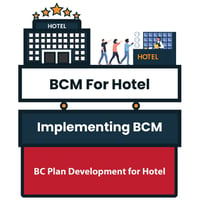
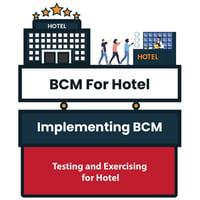
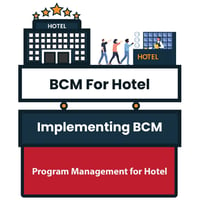
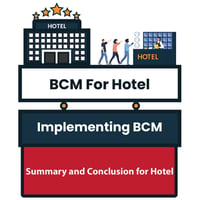
![Email to Sales Team [BCM Institute]](https://no-cache.hubspot.com/cta/default/3893111/3c53daeb-2836-4843-b0e0-645baee2ab9e.png)

